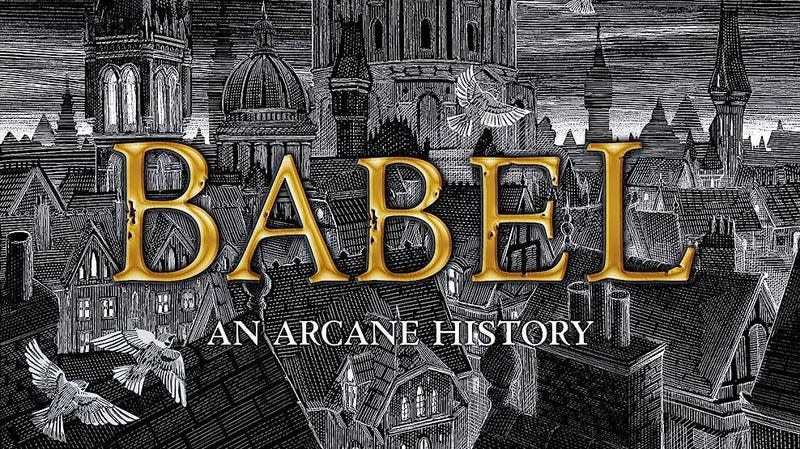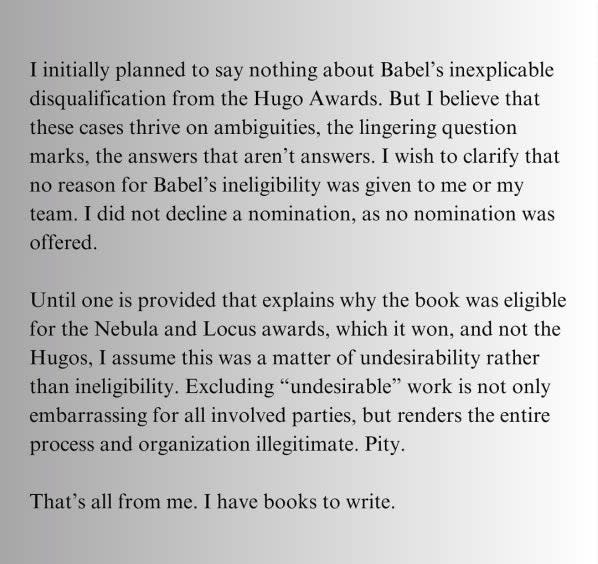The Hugo Awards Are Facing Yet Another Controversy

The Hugo Awards are no stranger to controversy. In recent years, the annual celebration of sci-fi and fantasy authors in media including novels, short stories, graphic novels, and scriptwriting (among others) has come under fire for a questionable sponsorship (defense contractor Raytheon Technologies), an anti-diversity movement that interfered with nominations (remember the Sad Puppies?), and a string of issues (misgendering a finalist, for one) that made it necessary to revamp the entire World Science Fiction Convention—the body that administers each year’s Hugos—in 2018.
And now there’s another controversy to add to the list. Though the 2023 Hugos were handed out in October, after the nominees were announced in July, the release of new nomination data has fans and authors asking questions about why certain writers and books were deemed “not eligible” for inclusion at last year’s event, presented by Chengdu Worldcon in Chengdu, China.
Read more
Florida Drivers Discover Hard Truth About EVs: They Eat Tires
Pain don’t hurt, but Jake Gyllenhaal’s Road House remake trailer might
No explanation was given for the exclusions, which also included a “not eligible” designation for Paul Weimer in the Best Fan Writer category. As the Hugo Awards website points out, “The Hugo Awards website does not administer the Awards. Each year’s Awards are administered by the that year’s World Science Fiction Convention, which is solely responsible for the conduct of that year’s Awards. If you send questions regarding the 2023 Hugo Awards to us, we can only forward them to the current year’s Hugo Award Administrators.” io9 has reached out to the Hugo Administration subcommittee of the 2023 Chengdu Worldcon for comment or clarification and will update should we receive a response.
In the comments on the Hugo Awards site blog post sharing the nomination stats, Weimer—the fan author noted above—raised a question asking for more clarity on the eligibility situation. A reply, posted by Kevin Standlee, a member of the Hugo Awards Marketing Committee, read: “As with every other year, the individual Worldcon makes its own decisions. We can only report what we are told by each Worldcon. We don’t run the awards. WSFS [World Science Fiction Society] rules give every Worldcon complete independence to run their own convention, subject of course to anything overriding the WSFS constitution such as local law.”
In a response to an io9 query sent to the Hugo Awards general email that cc’d the Chengdu subcommittee, Standlee explained, “Worldcon isn’t a single entity. The Hugo Awards isn’t a single entity. I don’t think those of us running the Worldcon.org, WSFS.org, and TheHugoAwards.org can speak on behalf of all of the different groups to which we are accountable. We don’t run any of those entities; we essentially just publish the official news that comes from them.” He directed us to his personal blog (“my personal opinions, not official ones of any other group”) which digs into “what I personally consider to be much of the overall context about how WSFS, Worldcon, and the Hugo Awards work in relation to the controversy about the 2023 Worldcon;” head to his page for more background information as well as an in-depth explanation of how Chengdu was chosen as the 2023 Worldcon site. In a follow-up email, he noted that “I was not a member of the 2023 Hugo Award Administration Subcommittee, and had nothing to do with their discussions or decisions.”
Earlier today, Kuang herself posted a response on Instagram:

Even with a (somewhat) clearer understanding of the different parties involved behind the scenes, this is still a tangled web. io9 will update this post if and when we learn more details in regards to the eligibility controversy.
Want more io9 news? Check out when to expect the latest Marvel, Star Wars, and Star Trek releases, what’s next for the DC Universe on film and TV, and everything you need to know about the future of Doctor Who.
More from Gizmodo
This ‘Low’ Mileage Honda CR-V Listing Shows We’re Reaching Peak Bring A Trailer
It's Not Diversity, But Plain Old Lazy Greed Endangering Boeing Planes
Sign up for Gizmodo's Newsletter. For the latest news, Facebook, Twitter and Instagram.

